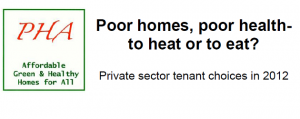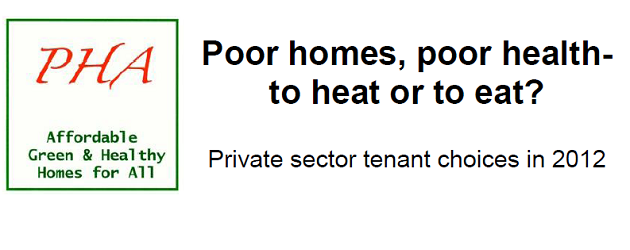A new report ‘Poor homes, poor health- to heat or to eat? Private sector tenant choices in 2012′, details the stark choices for private tenants on benefits and increased demands on the NHS.
 |
| [relatedPosts title=”Related Posts”] |
“The health of tenants in the private rented sector who are in receipt of housing and other benefits, is clearly being put further at risk as a consequence of the Government’s welfare reforms and poor conditions within the sector, and this is not just a London issue”, said Dr Stephen Battersby, Chair of the Pro Housing Alliance at the launch of a research report commissioned by the PHA – Poor homes, poor health- to heat or to eat? Private sector tenant choices in 2012.
He continued, “The study by GLHS shows that lack of security and high costs for what can be dangerous and unhealthy housing contributes to poor health including mental health. This is made worse by the difficulties of finding the money to keep warm and eat – sometimes tenants cannot do both. This will lead to greater demands on the NHS, and one wonders if this is part of a policy of coercion by destitution” he said.
Gill Leng who led the research said “Talking to tenants and advice agencies up and down the country has shown just how the cuts are impacting on people who already have very little money to live on. It is clear that health inequalities will be further increased not reduced”.
She highlighted one quote from a tenant interviewed in Blackpool where rent is comparatively cheap and the PRS accounts for 22% of the housing market, but who could not move to cheaper accommodation:
“It would have to be a tent in a field.”
A single pensioner interviewed said:
“I have lost contact with all my old friends because I am embarrassed about the circumstances I am living in and my lack of money.”
It is difficult for advice agencies too, who are in their own words “drowning under demand”. One adviser interviewed said
“People will live in dangerous situations with their fingers crossed rather than tackle their landlord.”
The worries about landlords and lack of security at the cheaper end of the market condemn tenants to suffer. As two quotes from the report highlight:
“Went to CAB about damp. Have had difficult conversations with landlord who threatened he would not renew my contract if I pursue this.”
“[Landlord] is not a nice bloke to get on the wrong side of.”
The report concludes that the Government should be doing more to assess the public health impacts of the welfare reforms, particularly as cutting one budget which merely reflects the high cost of housing, increases demands on other budgets such as GPs in the NHS.
The full report ‘Poor homes, poor health- to heat or to eat? Private sector tenant choices in 2012′is available here (PDF).
Further Information
- The report is based on interviews with Housing Advisers including Citizens Advice and private tenants in Camden, Exeter, Aylesbury Vale, Stoke and Trent and Blackpool.
- The Pro-Housing Alliance is an alliance of organisations and individuals who believe that housing is a key social determinant of health. Health inequality cannot be addressed unless there is access to housing that is both truly affordable and healthy. Members include:- Chartered Institute of Environmental Health; Team Homes; Care and Repair England; National Housing Forum; Home Improvement Trust; Housing Justice; C2O Future Planners; Camden Federation of Private Tenants; Zaccheaus 2000 Trust.
- The Report is dedicated to the memory of Professor Peter Ambrose who was one of the founders of the PHA and instrumental in setting up the research and whose work had previously highlighted the “exported costs” of poor housing. For example he was one of the authors of the report “The real cost of poor housing” published by the Building Research Establishment Press which assessed the cost of poor housing to the NHS alone as £600million per year, and that these costs are only about 40% of the total costs.
- The study was undertaken with generous support from Affinity Sutton and the Joseph Rowntree Foundation.
- The Government’s own data show that nearly 900,000 homes in the Private Rented Sector have a Category 1 hazard, that is, have a risk to health and safety from deficiencies in the home that pose an unacceptable risk to occupiers and visitors.
- Almost 1.4million homes in the PRS are classified as non-decent and 44% fail the standard on the “thermal comfort criterion’.





